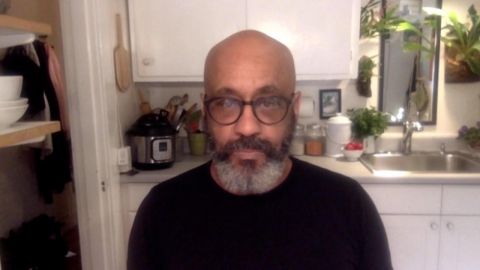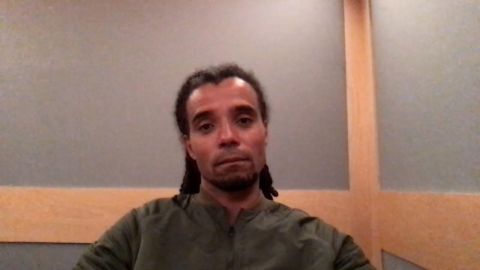Read Transcript EXPAND
Now, to the power of a different kind of music and art, amid love and terrible loss, the first case of AIDS was reported 40 years ago this month.
Millions of people all over the world have lost their lives to the virus. The San Francisco Gay Men’s Chorus feels the pain of that tragedy acutely.
It has lost over 300 sinners to AIDS since the choir was founded back in 1978. Clint Johnson had been a member of the Chorus for over 34 years. And
here he is with Michel Martin reflecting on the impact of the AIDS crisis and the legacy of the Chorus.
(BEGIN VIDEOTAPE)
MICHEL MARTIN: Thanks, Christiane. Clint Johnson, thank you so much for talking with us.
CLINT JOHNSON, MEMBER, SAN FRANCISCO GAY MEN’S CHORUS: Sure. My pleasure.
MARTIN: You know, we are acknowledging the 40th anniversary of the first reported cases of HIV/AIDS. Since then, it claimed 32 million lives
worldwide. But I was wondering if you wouldn’t mind taking us back to those early days when we really didn’t know what was happening. Do you remember
when you first heard about HIV/AIDS and what you heard and what that was like?
JOHNSON: Actually, yes, I do. I was actually visiting my parents at the time. And, you know, the first reports started coming in. And it was
confusing and it was unclear about what exactly was going on. Being part of a marginalized community in that way and working in the activism that, you
know, the Chorus does, you know, you are well aware of how your community is seen. And with the mixed reports and the confusion, if you will, around
how serious people were taking this and when it seemed to be more serious here in the community, was a little distressing.
MARTIN: I remember it well that there was a lot of stigma. There was a lot of — you know, there were shunning of people. People being afraid to have
people in their homes. There was this question of, you know, what can I do? Like, can you hug people? But I — but, you know, just sometimes when you
are going through something like that, you internalize it. What was that like for the Chorus? Did it strain relations within the group?
JOHNSON: I never experienced that and I didn’t see much of that. Although, I can’t imagine that, you know, it was completely devoid of any of that.
It’s people — it was — so much of that is fear based and what was happening was frightening.
The thing that impressed me more than anything else and made, you know — made an impression upon me was how people in the Chorus did not turn away.
That, you know, we embraced, you know, what we needed to do. We thought — you know, we thought about ways to make the lives of our friends and Chorus
members better. How can I step in to help? There was far less concern. I mean, there was obviously awareness of needing, you know, to be mindful of
your own safety and help.
But at the same time, the need was so great and so apparent. You know, when you are faced with that option, fortunately most people, you know, decide,
OK, the risk that I have to sustain or I have to bear is not as threatening or the implications of having to deal with that are not as grave as person
who was standing before me who now has to face death. Because at that time, it was a death sentence. And how do you walk away from somebody who you
know is standing near, somebody you know, somebody you work with, somebody you care about, you know, in various ways who is going to, based on how
things were going, quite possibly die a slow, painful, lonely and terrifying death. You know, how can you turn your back and say, you know,
my fear is more import than helping you through this?
MARTIN: So, people help each other through it?
JOHNSON: Oh, yes. Oh, yes.
MARTIN: How did they?
JOHNSON: We established care teams. And, you know, people would — we’d divvy up whatever kinds of responsibilities needed to be covered, you know,
to care for the person, be it housekeeping, grocery shopping, getting people to doctors’ appointments, making sure that visitors were there. You
know, all of the things that need to happen. Like when you — if you are caring for a family member who is ill, all of those things happen.
As an organization we began to focus on how to tell these stories. How to affirm our lives and the lives of the people that we were singing about.
How to bring joy when we can. How to help people not forget that there is so much more to our existence and our lives than this moment of discomfort
and pain.
MARTIN: I can’t think of any other way to ask this. But the Chorus lost, as I understand it, some 300 members to HIV/AIDS over the course of its
life. And, you know, you have had like 2,000 members overall. That is a huge number of people.
JOHNSON: It is.
MARTIN: I mean, losing 300 people is a huge number of people.
JOHNSON: It is. It is. I think the thing that is most powerful is not just the individuals, but because it has — it’s hard to separate myself from
the whole group experience because it happened to all of us at the same time. And no matter what part of the process you were involved in, be it,
you know, caring for somebody, grieving for somebody, just coming out of grieving for somebody, helping somebody care for somebody or caring for
somebody who just finished caring for somebody, there were all kinds of people around you constantly who were in that same place no matter what it
was.
So, it was never really a singular experience. And the losses, you know, it hurt me to see my friends lose their friends as much as it hurt me to lose
mine. But it is the — thing that hurts the most is — so, you are going to make me cry. The thing that hurts the most is, losing people that brought
such light to your life and to the world. And knowing that no matter how much you did, you couldn’t save them. Knowing how much was lost by the
people — other people in their lives and the joy that they brought, you know, how they made you feel, the work that they did, you know, the talents
that they shared, you know, it’s kind — it’s hard to fathom that amount of loss in that length of time because it didn’t stop.
There were people who sang, you know, came to rehearsals and prepared to sing as many concerts as they could. And, you know, you wondered if this
person is going make it to the show. And it is tough to go through that.
MARTIN: Did you feel — did you ever people like it was just too much?
JOHNSON: Yes.
MARTIN: Like you want to get in your car and drive away and just not come back?
JOHNSON: Yes. And that’s where some of — you know, some guilt comes in. Because there were times when I couldn’t do another memorial. You know, I
just — I could not. I just didn’t have it in me. And as much as I wanted to honor the person who had passed, I just couldn’t do it. I have not —
and I know so many, you know, survivors who have not been able to process the amount of loss.
I mean, how do you — like for some — I know people who lost hundreds of friends in, you know, a year. How do you process that amount of loss? When
you came together in many respects as a family because the world was not having you. You know, the world was not going support. So, you bonded
together over the things that you shared in common. And all of these people are gone. They are gone. And so much of the world didn’t seem to care.
MARTIN: There is this famous picture that the artistic director came up with this idea to represent the toll.
JOHNSON: Yes.
MARTIN: Eric Luse of the Chronicle took a portrait of the Chorus showing seven of their members in a white dress shirt with the rest dressed in
black facing away from the audience. And the seven in white represented — tell me again just what represented what. The seven were the survivors and
all the rest were those who had died?
JOHNSON: Yes.
MARTIN: So, you had basically these kinds of dots of white in a sea of black.
JOHNSON: Yes.
MARTIN: That must have been — I don’t know, just even being there kind of gives me chills — gives you chills.
JOHNSON: Yes. It was an interesting thing. It was an interesting experience to have. Also, I was thinking about this the other day because
we did another piece many — not too long ago called “Unbreakable.” And one of the movements in it was a called 41. And it was about the first 41
people who were — you know, who the world found out had passed away. And as we’re seeing this movement, we are turning our backs in bunches, to
represent — you know, as we’re counting the numbers, people are turning around.
So, that by the end of the movement, everybody’s back is turned. And it gave the audience an idea of what it felt like to, you know, be just
discounting, where you are just counting the bodies and you are just watching, you know, the back’s turns as this person’s face disappears. That
person’s face disappears. So, it is a powerful statement and a powerful experience.
MARTIN: How did you balance the need to challenge and the need to say hard things with also the need to bring joy and comfort to people?
JOHNSON: Well, our artistic directors have been very, very good about being able to combine a mix of things. So, we have — you know, we — you
have your moment that, you know, with tears. You know, where we’re going to make you cry. Moments that are going to give you the chills and moments
that are going to make you laugh, because these are all the things that make up the life experience.
(BEGIN VIDEO CLIP)
(MUSIC PLAYING)
(END VIDEO CLIP)
JOHNSON: And the one thing we don’t want to do is do what is done to us and narrow us down to this very slice of what our life experience actually
is. I think during, you know, the epidemic, I think of the pain and I think of the loss but I also think of the beauty that I saw and the courage and
the strength of the people around me. And, you know, I — we are mindful that we are full people, we are complete, we are varied in our views and
experiences. And we don’t want to be re reductive.
MARTIN: Do you have a favorite piece that represents that for you?
JOHNSON: One song that we do that speaks to me is called “Never Ever.” And it is on a piece that we did in ’96, I believe, called “Naked Man,” which
is a suite of songs about the gay experience. It is based on stories and interviews from men in the Chorus. So, it is telling actually stories. And
“Never Ever” is the one that speaks to, I think, one of the things that we learned and that everybody, hopefully, learns. And unfortunately, is often
learned at great expense and loss. That the moment you have before you is really the only moment that you have. And, you know, you should treat each
moment as a gift.
MARTIN: Give me a couple bars.
JOHNSON: Never will there be a moment ever when we all will be together never.
(BEGIN VIDEO CLIP)
(MUSIC PLAYING)
(END VIDEO CLIP)
MARTIN: Could you talk a bit more about the music that the Chorus performs and how is the experience of AIDS reflected in the repertoire?
JOHNSON: I think it is both reflected in the actual music that we pick in terms of the stories that we tell, some of the stories we tell. We often
speak of it. You know, our director speaks about it during the performance or there are other ways to bring, you know, what we call our “Fifth
Section,” which is, you know, the members that have passed away. We do performances at times where we have a stool with a rose and they show the
list of names. So, we do things like that.
And I think that our sensitivities, you know, our emotional sensitivities and awareness is different. So, we are more conscious of telling meaningful
stories about ourselves. You know, making sure that we show — we speak the truth of who we are, regardless of how painful it is to tell or hear.
MARTIN: Now, we as a country, as a world, you know, this last year and a half, we’ve been living through another epidemic. And I just have to wonder
what that brought up for you.
JOHNSON: A lot. A lot. I thought about that early on. You know, I was actually texting some friends and mentioned how, you know, for better or
worse, we’ve been here before. We know what social lockdown, and emotional lockdown looks and feels like. We know what it is like to have those in
charge seemingly uninterested in our welfare. So, it was retraumatizing in a way.
We don’t know what tomorrow will bring. And the AIDS epidemic kind of, you know, put that in high relief. And the pandemic, in many ways, put that in
high — you know, the uncertainty that people felt around everything and how one thing can cascade into other things. And people are going to be
afraid of you and not want to help you and run from you. That was all very, very familiar. It is just that with this pandemic, it happened to
everybody. Whereas with AIDS, it was concentrated in my community. And that was — that was, I think, the starkest difference. That it was not a public
concern. It was a political concern. And the cause for further vilification as opposed to attempts to understand and figure out how we can get out of
this.
MARTIN: Before we let you go, I was wondering how would you want us to think of this period, the period of the greatest loss?
JOHNSON: What I would like to see is people to not — again, not just to remember the horror of it all but remember the depth of humanity that my
community showed. The grace that, you know, my community and my friends showed. The strength, the resilience. All of the things that, you know,
remember us for the things that allowed us to survive this.
Because I saw the best that humanity has to offer in the people that surrounded me. And we are not always seen as that community. You know,
we’re seen as — we’re often seen as frivolous. And, you know, all kinds of, you know, as it was alluded to earlier, of the reductive ways in which
we’re viewed when the depth of the humanity was astounding, the generosity, the compassion, the empathy. All of those things that allowed us to not
only to take care of each other but take care of ourselves and our community.
Who you are is shown when your back is up against the wall. Push came to shove, and this is what we did. So, remember us for that.
MARTIN: Clint Johnson, thank you so much for talking with us.
JOHNSON: My pleasure.
About This Episode EXPAND
The first case of AIDS was reported 40 years ago this month. Since then, millions of people all over the world have lost their lives to the virus.
LEARN MORE


